Rear Disc Brake Pads Replacement
Special Tools
| • | CH-6007-B Disc Brake Piston Installation Tool |
For equivalent regional tools, refer to Special Tools .
Removal Procedure
Warning: Refer to Brake Dust Warning in the Preface section.
Warning: Refer to Brake Fluid Irritant Warning in the Preface section.
- Inspect the fluid level in the brake master cylinder reservoir.
- If the brake fluid level is midway between the maximum-full point and the minimum allowable level, no brake fluid needs to be removed from the reservoir before proceeding.
- If the brake fluid level is higher than midway between the maximum-full point and the minimum allowable level, remove brake fluid to the midway point before proceeding.
- Raise and support the vehicle. Refer to Lifting and Jacking the Vehicle .
- Remove the tyre and wheel assembly. Refer to Tyre and Wheel Removal and Installation .
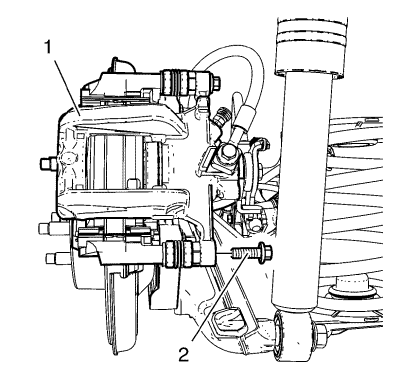
- Remove the brake calliper lower guide pin bolt (2).
Caution: Support the brake calliper with heavy mechanic wire, or equivalent, whenever it is separated from its mount and the hydraulic flexible brake hose is still connected. Failure to support the calliper in this manner will cause the flexible brake hose to bear the weight of the calliper, which may cause damage to the brake hose and in turn may cause a brake fluid leak.
- Without disconnecting the hydraulic brake flexible hose, pivot the calliper (1) upward and secure the calliper with heavy mechanics wire, or equivalent.
Mark the brake calliper piston position to the brake calliper (1).
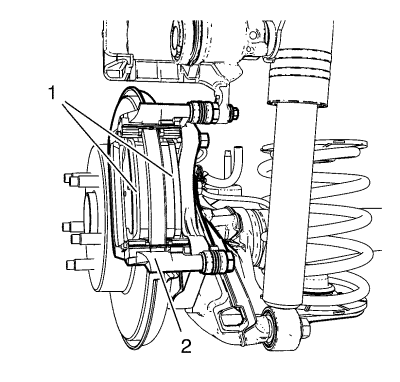
- Remove the brake pads (1) from the calliper mounting bracket (2).
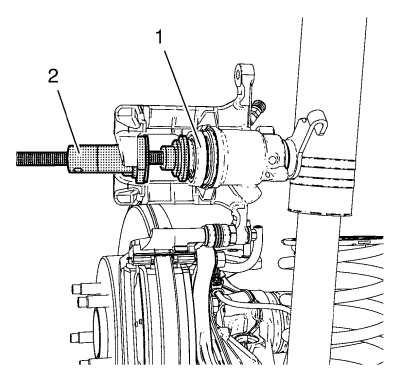
- Turn back the disc brake calliper piston (1) into the calliper bore using the CH-6007-B installation tool with CH-6007-50 adapter (2).
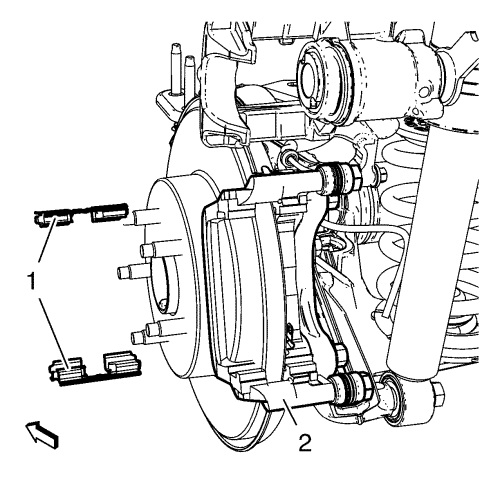
- Remove the brake pad retainer springs (1) from the calliper bracket (2).
- Thoroughly clean the brake pad hardware mating surfaces of the calliper bracket of any debris and corrosion.
- Inspect the brake calliper guide pins for freedom of movement, and inspect the condition of the guide pin boots. Move the guide pins inboard and outboard within the bracket bores, without disengaging the slides from the boots, and observe for the following:
| • | Restricted calliper guide pin movement |
| • | Looseness in the brake calliper mounting bracket |
| • | Seized or binding calliper guide pins |
- If any of the conditions listed are found, the brake calliper guide pins and/or boots require replacement.
Installation Procedure

- Ensure the brake pad hardware mating surfaces are clean.
- Install the brake pad retainers springs (1) to the brake calliper bracket (2) and apply a thin coat of high temperature silicone lubricant to the brake pad retainers. Refer to Adhesives, Fluids, Lubricants, and Sealers

Note: The wear sensor equipped disc brake pad must be mounted inboard of the rotor with the leading edge of the sensor facing the brake rotor during forward wheel rotation, or at the top of the pad when installed in vehicle position.
- Install the brake pads (1) to the calliper bracket (2).
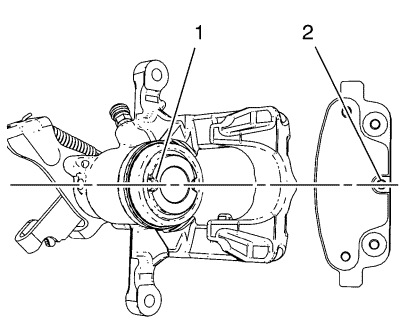
- Check the correct position of disc brake calliper piston (1).
Cavities for brake pad anti rotation pin (2) must be aligned as shown in graphic, in order to ensure an appropriate mounting onto the inner brake pad.

- Remove the support, and rotate the brake calliper (1) into position over the disc brake pads and to the calliper mounting bracket.
Caution: Refer to Fastener Caution in the Preface section.
- Install the lower brake calliper guide pin bolt (2) and tighten to 28 N·m (21 lb ft).
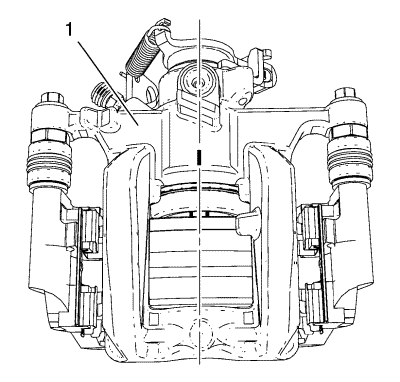
- Checking position of piston cavity after assembling calliper (1)
- Install the tyre and wheel assembly. Refer to Tyre and Wheel Removal and Installation
- Lower the vehicle.
- With the engine OFF, gradually apply the brake pedal approximately 2/3 of its travel distance.
- Slowly release the brake pedal.
- Wait 15 seconds, then gradually apply the brake pedal approximately 2/3 of its travel distance again until a firm brake pedal apply is obtained. This will properly seat the brake calliper pistons and brake pads.
- Fill the master cylinder auxiliary reservoir to the proper level. Refer to Master Cylinder Reservoir Filling
| © Copyright Chevrolet. All rights reserved |
| © Copyright Chevrolet. All rights reserved |








